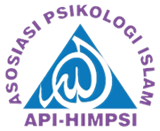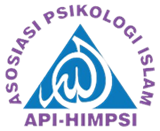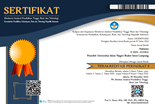From College to Career: Career Readiness as a Driver of Work Readiness in Final-Year Students
Abstract
The number of higher education graduates entering the industrial workforce has declined. One of the factors influencing this issue is the low level of work readiness among university graduates. Work readiness is considered an important aspect that can contribute to increasing the absorption of graduates into the workforce. The low work readiness of university graduates needs to be addressed to prepare students to enter the job market in line with industry demands. This study aims to identify the relationship between career readiness and work readiness among final-year students. The subjects in this study were 90 final-year students from various majors. The study used a correlational quantitative approach, employing career and work readiness scales. The results of this study indicate that the hypothesis is accepted: career readiness is related to work readiness among final-year students (r = 0.590, p = 0.001, p < 0.05). The higher an individual's capacity to prepare for their career, the higher their work readiness. These findings suggest that forming a clear picture of one's career can be important in preparing to face the world of work.
Keywords:Career readiness; college student; correlational analysis; work readiness
Full Text:
PDFReferences
Ainiyah, B.H., & Husna, F.H. (2022). Peran Career Decision Making Self Efficacy (CDMSE) sebagai Prediktor Kesiapan Kerja Mahasiswa Tingkat Akhir Fakultas Ushuluddin Adab dan Dakwah UIN Sayyid Ali Rahmatullah Tulungagung. Skripsi Tidak dipublikasikan. UIN Sayyid Ali Rahmatullah Tulungagung.
Alam, S. (2016). Tingkat Pendidikan dan Pengangguran di Indonesia (Telaah Serapan Tenaga Kerja Sma/Smk dan Sarjana). Jurnal Ilmiah Bongaya, 1(1), Article 1.
APEC. (2015). A report on the APEC-regulated labour markets: Evidence of Skills Shortages and General Trends in Employment-The Value of Better Labour Market Information Systems. Singapore: APEC HRD Working Group.
Azwar, S. (2017). Metode Penelitian Psikologi (Edisi II). Yogyakarta: Pustaka Pelajar.
Badan Pusat Statistik. (2022). Keadaan Ketenagakerjaan Indonesia Agustus 2022. Jakarta: Pelayanan Statistik Terpadu.
Badan Pusat Statistik. (2022). Pertumbuhan Ekonomi Indonesia Triwulan IV-2022. Jakarta: Pelayanan Statistik Terpadu.
Burgess, J., Cameron, R., Dhakal, S. P., & Brown, K. (2018). Introduction: Applicant work-readiness and graduate employability challenges in the Asia Pacific. In R. Cameron, S. Dhakal, & J. Burgess (Eds.), Transitions from Education to Work: Workforce Ready Challenges in the Asia Pacific (pp. 3-15). Routledge. https://doi.org/10.4324/9781315533971
Caballero, C. L., & Walker, A. (2010). Work readiness in graduate recruitment and selection: A review of current assessment methods. Journal of Teaching and Learning for Graduate Employability, 1(1), Article 1. https://doi.org/10.21153/jtlge2010vol1no1art546
Caballero, C. L., Walker, A., & Fuller-Tyszkiewicz, M. (2011). The Work Readiness Scale (WRS): Developing a measure to assess work readiness in college graduates. Journal of Teaching and Learning for Graduate Employability, 2(1), Article 1. https://doi.org/10.21153/jtlge2011vol2no1art552
Dodd, V., Hanson, J., & Hooley, T. (2021). Increasing students’ career readiness through career guidance: Measuring the impact with a validated measure. British Journal of Guidance & Counselling, No Pagination Specified-No Pagination Specified. https://doi.org/10.1080/03069885.2021.1937515
Gajda, J. (2019). Professional Adaptation of New Employees to the Organization. System Safety: Human - Technical Facility - Environment, 1(1), 929–938. https://doi.org/10.2478/czoto-2019-0118
Gysbers, N. C. (2013). Career-Ready Students: A Goal of Comprehensive School Counseling Programs. The Career Development Quarterly, 61(3), 283–288. https://doi.org/10.1002/j.2161-0045.2013.00057.x
Handayani, T. (2015). RELEVANSI LULUSAN PERGURUAN TINGGI DI INDONESIA DENGAN KEBUTUHAN TENAGA KERJA DI ERA GLOBAL. Jurnal Kependudukan Indonesia, 10(1), 53. https://doi.org/10.14203/jki.v10i1.57
Ihsan, M. (2018). Analisis Faktor-Faktor Yang Mempengaruhi Kesiapan Kerja Pada Siswa SMK Negeri 1 Sinjai. Jurnal Pendidikan, 6(2), 105–115. https://doi.org/10.36232/pendidikan.v6i2.156
Li, J., Huang, Y., Fong, D. Y. T., Chen, J., & Song, Y. (2022). Work readiness: Its determinants and association with work-related outcomes among new graduate nurses. Journal of Nursing Management, 30(7), 2968–2981. https://doi.org/10.1111/jonm.13691
Mahmud, M. I., Amat, S., Bakar, A. Y. A., Kee, C. P., & Othman, Z. (2022). The Effects of Career Readiness Course on Students Career Decision Self-Efficacy During Covid 19. Specialusis Ugdymas, 2(43), Article 43.
Masole, L., & van Dyk, G. (2016). Factors influencing work readiness of graduates: An exploratory study. Journal of Psychology in Africa, 26(1), 70–73. https://doi.org/10.1080/14330237.2015.1101284
McKinsey Global Institute. (2019). Otomasi dan Masa depan Pekerjaan di Indonesia. https://www.mckinsey.com/~/media/mckinsey/featured%20insights/asia%20pacific/automation%20and%20the%20future%20of%20work%20in%20indonesia/automation-and-the-future-of-work-in-indonesia-indonesian.pdf
Prikshat, V., Nankervis, A., Burgess, J., & Dhakal, S. (2019). Conceptualising graduate work-readiness: Theories, concepts and implications for practice and research. In S. Dhakal, V. Prikshat, A. Nankervis, & J. Burgess, (Eds.). The Transistion from Graduation to Work. (pp. 15-29). Singapore: Springer.
Priyono, S., & Nankervis, A. (2019). Graduate work-readiness challenges in Indonesia-Finding from a multiple stakeholder study. In S. Dhakal, V. Prikshat, A. Nankervis, & J. Burgess, (Eds.). The Transistion from Graduation to Work. (pp. 107-123). Singapore: Springer.
Ranganathan, A. (2018). Train Them to Retain Them: Work Readiness and the Retention of First-time Women Workers in India. Administrative Science Quarterly, 63(4), 879–909. https://doi.org/10.1177/0001839217750868
Ridho, A., & Siswanti, A. D. (2020). Future perspective and work readiness on students. Jurnal Psikologi, 19(2), 201–210. https://doi.org/10.14710/jp.19.2.201-210
Sampson Jr., J. P., McClain, M.-C., Musch, E., & Reardon, R. C. (2013). Variables Affecting Readiness to Benefit From Career Interventions. The Career Development Quarterly, 61(2), 98–109. https://doi.org/10.1002/j.2161-0045.2013.00040.x
Savickas, M. L., Porfeli, E. J., Hilton, T. L., & Savickas, S. (2018). The Student Career Construction Inventory. Journal of Vocational Behavior, 106, 138–152. https://doi.org/10.1016/j.jvb.2018.01.009
Sholikah, M., Muhyadi, M., Indartono, S., Kenzhaliyev, O. B., & Kassymova, G. K. (2021). Self-Efficacy and Student Achievement for Enhancing Career Readiness: The Mediation of Career Maturity. Jurnal Pendidikan Teknologi Dan Kejuruan, 27(1), Article 1. https://doi.org/10.21831/jptk.v27i1.35657
Walker, A., & Campbell, K. (2013). Work readiness of graduate nurses and the impact on job satisfaction, work engagement and intention to remain. Nurse Education Today, 33(12), 1490–1495. https://doi.org/10.1016/j.nedt.2013.05.008
DOI: http://dx.doi.org/10.24042/ajp.v8i1.26188
Refbacks
- There are currently no refbacks.
Copyright (c) 2025 Fatiya Halum Husna













